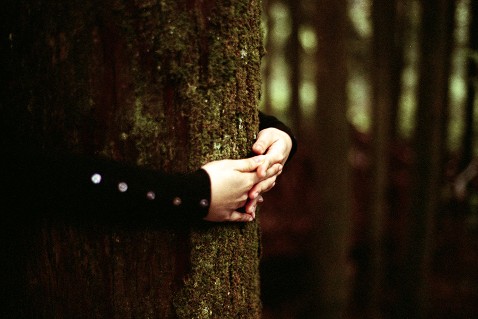questions and answers
/ photo by wakingphotolife.
photo by wakingphotolife.
What is Lucy made of, Mama?
She is made of people ash with bone.
She is white, almost. Sometimes grey.
She had no knuckles, she was too young, I think. So there are no knuckles bones. So she is the other bones with people ash. That is what her body is made of, daughter.
But the important part of her is made of whispers and prayers and paint fumes on a spring morning, a candle lit to push away the stink of it, and a moment we took advantage of. The wind blows the chimes in the dining room.
She is made of chimes.
She is made of sprouts and nests and small mites writhing in hay. There is a chipmunk who sits on the roof of the garage. I wave to him every morning. She is made out of him.
She is made of wood blocks and printing ink. She is made of porcelain and papier-mâché. She is made of vine charcoal and 90lb. paper, shredded and waterlogged with seeds embedded in its pulp. She is made of summer and fiddleheads. Yoga and smoothies with berries and almond butter. She is made of long flowing skirts, and a purple dress that made me look like Barney, but feel like a goddess.
She is made of email fights and heartbreak and broken clavicles, too. I try not to talk about that part of her, because I used to believe that the dark parts of her making killed her. Sometimes I think that is what made her live so long. It gave her tenacity. She is made of strength.
She is made of the moon. Further, she is the moon. Hanging effortlessly over our nights, disappearing gradually day by day, and then appearing again, brighter and closer than ever. She is also made of winter solstice. She is made of icicles and darkness and sad songs about sunshine and being taken away
She is made of atoms and stardust and self-sacrifice. She is made of nothing, but everything.
How old is Lucy now, Mama?
She is as old as the trees, my love. Her roots are so far into the earth, they are lava and rock. She is the Anasazi. She is the crone. She is the baby whose bough is breaking. She is as old as the canyons and young as the idea. She is a moss-covered age, one with ferns at her base. She is sixteen and driving erratically. She is eighty and hunched over in secret lives never lived.
She is three and two months old. Younger than you, but also ancient, like the gods, and at the same time, she is always newborn.
What happens when we die, Mama?
Our skin grows cold and turns ashen. Our body becomes stiff. The skin around the fingernails recede making every fingernail longer. The skin hides away and reveals something animal about our humanity. The meaning of life is gone then. The carnal meaning, I mean. The impulse for more is gone. We are just skin and bone. We are carbon, filtering into earth. It nourishes something lovely, we like to think. That also is transitory. The spark leaves our eyes and enters other people's hearts and burns brightly. So brightly it feels like fear. I want to tell you that our body is a shell, as cumbersome and heavy as a turtle. We figured out how to carry it, but it is not comfortable. The part that rots and makes a home for other creatures of the dark, that part is not us. It is something else. It is soil. It is life in its death. We do not have a soul, baby. We are a soul and have a body. I read that once. I believe that.
But what happens to our soul, baby, is not my privilege to know. I just sense that we become part of every person and everything, like a raindrop falling into the ocean. Can we separate the raindrop again? Never, but we still are water.
What do you think happens when we die, baby?
I think we go into trees, Mama. That is why it is very important to hug trees.
+++
What round about answers are you giving these days? What kind of questions do you get asked, either by children or adults, that stump you? How do you answer them? What kind of questions do you ask? Are your answers concrete or esoteric? Have your answers changed over time?
or alternatively, you can just tell me what your child is made of...

